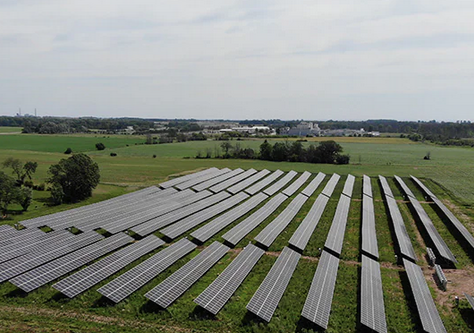Merck, a leading science and technology company, today announced a major step towards executing its sustainability strategy.
16-year renewable energy contract for the Liberty County Solar project in Texas
Project expected to be operational in 2024
Propels Merck to 90% purchased renewable electricity in the U.S.
Merck, a leading science and technology company, today announced a major step towards executing its sustainability strategy. The company signed for its Electronics business a 16-year, off-site, virtual power purchase agreement (VPPA) with Recurrent Energy for the construction of the Liberty County Solar project in Texas, United States. Combined with the Azure Sky wind and storage project, Merck will match 90% of the company’s purchased electricity consumption in the United States from renewable energies. Globally, the company will match 55% of its purchased electricity consumption from renewable energies. Merck aims to increase this to 80% by 2030.
“We have set ourselves ambitious goals and want to do our part to enable more sustainable supply chains worldwide as well as being climate-neutral by 2040. In addition to matching our electricity consumption with renewable energy, our research and development work can support our customers on their path to greater sustainability. With these milestones, we are able to support the fast-growing semiconductor industry with sustainable business practices,” said Kai Beckmann, Member of the Executive Board of Merck and CEO Electronics. “The Liberty County Solar project in Texas is just one example of our efforts. Merck is continuing to actively pursue renewable energy and not only in the United States,” Beckmann added.
With 40 megawatts (MW) of the 100 MW project capacity, Merck is the anchor buyer within the Net Zero Consortium for Buyers, an aggregation of corporations organized by the Sustainability Roundtable, Inc. The Liberty County Solar project alone will match 25% of Merck's purchased electricity consumption in the United States and approximately 10% globally. The project is expected to be operational in 2024 and will be located north-east of Houston in Liberty County, Texas, United States.
Renewable energy as an essential part of achieving sustainability goals
Renewable energies play an important role in the mix of measures to achieve the company's sustainability goals. In Spring 2021, Merck signed a VPPA with Enel Green Power for the Azure Sky wind and storage project in Texas, which started operations in May 2022. This project delivers renewable energy certificates to match 65% of Merck's total purchased U.S. electricity consumption or 100% of the Life Science business' U.S. electricity consumption.
In Summer 2022, Merck fully installed 7,000 solar panels across approximately 11 acres of land on the company’s Sheboygan campus in Wisconsin, United States. This project adds 2.25 megawatts to the grid. The company will receive approximately 4,000 renewable energy certificates produced by the panels per year. Those certificates match 16% of the Sheboygan site’s energy consumption.
Earlier this year, the company announced a strategic cooperation with ENTEGA, a regional German energy supplier, to install rooftop photovoltaic systems at its Headquarter in Darmstadt, Germany, and to build a photovoltaic park on approximately seven hectares in Gernsheim, Germany. Both projects are expected to be completed before the end of 2023 and together will generate up to 7.6 megawatts of solar energy annually.
In May 2022, the independent Science Based Targets initiative (SBTi) confirmed that the company’s targets correspond to the current status of climate science. On its journey to achieving climate-neutrality by 2040, Merck has committed to lowering its absolute direct (Scope 1) and indirect (Scope 2) greenhouse gas emissions by 50% by 2030 and reduce its indirect emissions along the entire value chain (Scope 3) by 52% per euro value added by 2030. The baseline year is 2020. The company's progress is documented in the sustainability report 2022.
www.merckgroup.com
